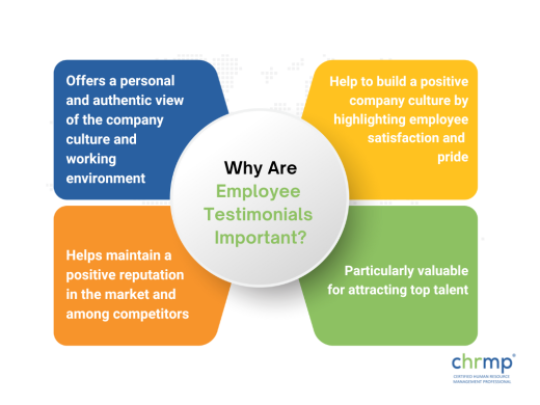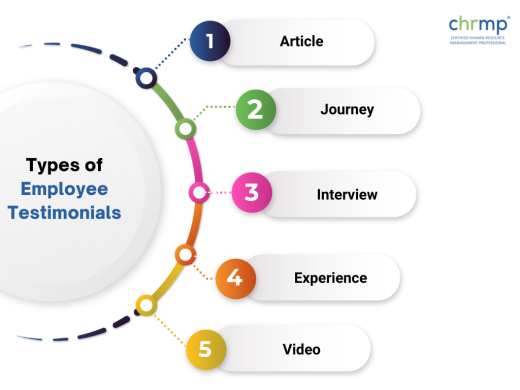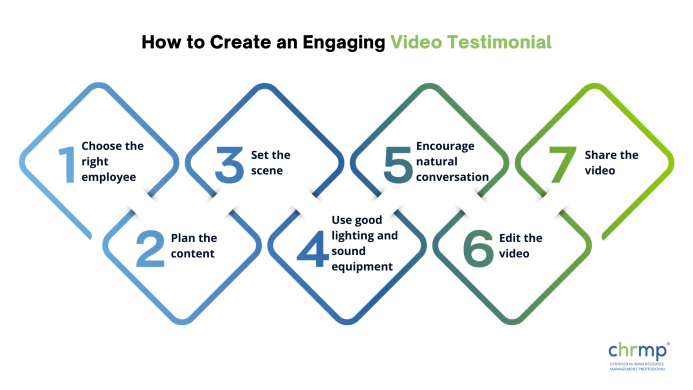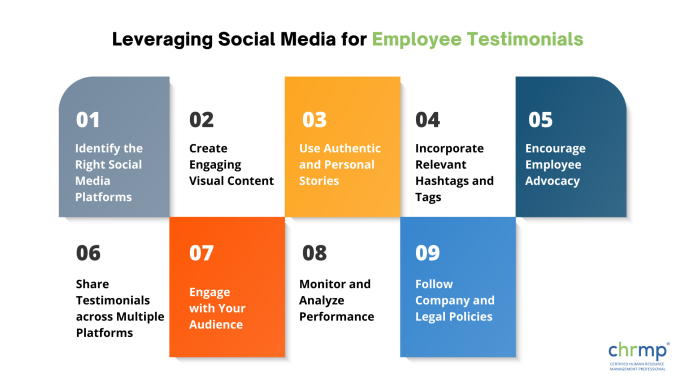

Employee retention is quickly becoming a concern in today’s competitive corporate environment. Employee testimonials are therefore emerging as a powerful tool for attracting and retaining top talent and building a positive company culture.
Suppose companies can retain their talented employees and prevent them from being lured away by competitors. In that case, that is considered a statement of faith and trust employees have in the company. By sharing stories and experiences from current employees, organizations can showcase the unique qualities and benefits of working at their company.
In this blog, we will explore some winning and inspiring employee testimonials.
So whether you’re looking to create employee testimonials or simply seek inspiration, these examples will surely provide valuable insights and ideas.
Let’s jump right in.
An employee testimonial is a statement or review from a current or former employee about their experience working at a company. It highlights the employee’s satisfaction with their job, compensation package, company culture, and other factors that make them proud to work for the organization.
Companies often use employee testimonials for recruiting and advertising purposes, as they provide a perspective from the employee’s point of view on what it’s like to work for the company and can help attract top talent.
They can also help build a positive company culture by showcasing employee satisfaction and highlighting the organisation’s unique benefits.
The reputation of a company sometimes depends on employee testimonials. By giving current and former employees the opportunity to share their experiences, organizations can provide potential candidates, customers, and other stakeholders an inside look at what it’s like to work for the company.

This information can be particularly valuable for attracting top talent, as it offers a more personal and authentic view of the company culture and working environment than traditional recruiting materials like job descriptions and company websites.
Employee testimonials can help to build a positive company culture by highlighting employee satisfaction and pride. By showcasing the unique benefits and experiences of working for the organization, companies can create a sense of being a community or a large family.
Finally, employee testimonials can also help to build trust and credibility with potential candidates, customers, and other stakeholders.
By providing a first-hand perspective on what it’s like to work for the company, organizations can demonstrate their commitment to transparency and open communication, which can help to establish and maintain a positive reputation in the market and among competitors.
The following examples highlight the positive experiences of employees at a fictional company and offer a glimpse into what it’s like to work there:
“Working at [Company Name] has been an incredible experience for me. The supportive and collaborative culture, combined with challenging and meaningful work, makes coming to work every day a joy. I feel valued and appreciated as a member of the team, and I’m constantly learning and growing in my role.”
“I’ve been with [Company Name] for several years now, and I can confidently say it’s the best company I’ve ever worked for. The management team is transparent, fair, and always available to listen to employee feedback. They care about our professional development, skill advancement, career growth and work-life balance, which makes a big difference in our times when working overtime is rather a norm than an exception.”
“I joined [Company Name] as a junior member of the team and have since been given the opportunity to take on more responsibility and grow in my role. The company’s emphasis on continuous learning and growth has allowed me to gain new skills and advance in my career. I’m grateful for the supportive and inclusive work environment that encourages us to bring our best selves to work every day.”
“The company culture at [Company Name] is like no other. It’s a place where everyone feels like family or belonging to the same community working together towards a common goal. The leadership team is approachable, transparent in their dealings and always available to support and guide us in our work. I’m proud to be a part of such a dynamic, supportive and innovative company.”
Here are five different types of employee testimonials that companies can use to showcase their work culture and impact on the lives of their employees:

Let’s discuss the types of employee testimonials in detail.
This type of testimonial is written in the form of a blog post or article, and gives an in-depth look into an employee’s experience at the company. It can include details on their role, responsibilities, support, training, development and what they like most about working there.
This type of testimonial focuses on an employee’s journey at the company, highlighting the growth they’ve experienced both professionally and personally. This type of testimonial can be really impactful when an employee who started as a junior member of the team and has since advanced in their role to upper management level.
This type of testimonial is a recorded or written interview with an employee, where they are asked questions about their experience working at the company. This type of testimonial provides a more personal and conversational look into an employee’s experience.
This type of testimonial is a short and concise statement from an employee about their experience working at the company. It can be used to provide a quick snapshot of the employee’s overall experience, and is often used in company brochures, advertisements or websites.
This type of testimonial is a recorded video of an employee talking about their experience working at the company. Video testimonials can be really impactful, as they provide a personal, visual look into the employee’s experience, allowing the audience to connect with the employee on a more emotional level.
Here are some tips to create an engaging video testimonial:

Let’s discuss them in detail.
Select an employee who is passionate about their job and the company, and who has a compelling story to tell. We should look for employees who are articulate and comfortable speaking on camera at the same time who has not had any issues with the company or product which is still waiting to be resolved.
Before filming, we have to be ready with a script or a questionnaire to ask the employee. The questions should focus on the employee’s experiences and how the company has impacted their life for the better on both professional and family front. Keep the questions open-ended to allow for a natural and engaging conversation.
We will have to choose a location for the video that is appealing and has good lighting. Ensure the background is an uncluttered and professional-looking workplace.
Proper lighting and sound equipment can make a big difference in the quality of the final video. Invest in a good quality microphone and lighting to ensure clear audio and visually appealing footage.
Avoid asking the employee to recite the script word to word. Instead, encourage a natural conversation by asking open-ended questions and allowing the employee to speak freely and openly without being self conscious.
After filming, edit the video to remove any pauses, stutters, or distractions. Keep the final product concise and focused, highlighting the key points and quotes from the employee.
Share the video on the company’s website, social media platforms, and other marketing channels to reach a wide audience. Make sure to promote the video and encourage employees and customers to share it with their networks.
Remember, the goal of the video testimonial is to provide an authentic look into the experiences of the employee and showcase the positive impact the company has had on their life. By following these tips, we can create an engaging and impactful video testimonial that will help attract new talent and build trust with potential customers.
Leveraging social media for employee testimonials can be an effective way to amplify your employer brand and reach a wider audience.
Here are some tips on how to effectively use social media for showcasing employee testimonials:

Let’s take a closer look at these tips.
1. Identify the Right Social Media Platforms:
Determine which social media platforms are most commonly used by your target audience and where your company has a strong presence. Focus on platforms that are popular among job seekers and professionals, such as LinkedIn, Twitter, Facebook, and Instagram.
2. Create Engaging Visual Content:
Visual content, such as images and videos, tend to perform well on social media. Consider creating visually appealing graphics, images, or videos featuring employee testimonials that are shareable and eye-catching. Include compelling quotes from employees, their photos, and relevant branding elements to make the content more engaging.
3. Use Authentic and Personal Stories:
Authenticity is key when it comes to employee testimonials. Encourage employees to share their personal stories and experiences in their own words. Avoid scripted or overly promotional language, and focus on genuine and relatable stories that resonate with your audience.
4. Incorporate Relevant Hashtags and Tags:
Use relevant hashtags and tags in your social media posts to increase visibility and reach. Research and include industry-specific hashtags, as well as tags related to your company, to make your content more discoverable by potential candidates and others interested in your industry.
5. Encourage Employee Advocacy:
Encourage your employees to share their testimonials on their personal social media accounts. Employee advocacy can help amplify your employer brand and reach a wider audience. Provide employees with guidance on how to share testimonials effectively and safely, and consider implementing an employee advocacy program to incentivize and recognize their efforts.
6. Share Testimonials across Multiple Platforms:
Don’t limit yourself to just one social media platform. Share your employee testimonials across multiple platforms to maximize your reach. Adapt your content to suit the specific requirements and best practices of each platform, and ensure consistency in branding and messaging.
7. Engage with Your Audience:
Social media is a two-way communication channel. Engage with your audience by responding to comments, messages, and inquiries related to your employee testimonials. Show appreciation for positive feedback and address any questions or concerns promptly and professionally.
8. Monitor and Analyze Performance:
Monitor the performance of your social media posts featuring employee testimonials using analytics tools provided by the social media platforms. Analyze the data to understand which posts are performing well, and adjust your social media strategy accordingly to optimize engagement and reach.
9. Follow Company and Legal Policies:
Ensure that you follow your company’s social media policies and guidelines when sharing employee testimonials on social media. Also, be mindful of any legal requirements, such as obtaining proper consent from employees before sharing their testimonials, and comply with relevant laws and regulations.
By leveraging social media effectively, you can amplify the impact of your employee testimonials, enhance your employer brand, and attract potential talent to your organization. Remember to always prioritize authenticity, engage with your audience, and follow company and legal policies to ensure a successful social media strategy for showcasing employee testimonials.
1. What are employee testimonials used for?
Employee testimonials are used to showcase the work culture, values, and impact of a company on the lives of its employees. They provide an authentic look into the experiences of employees and help attract new talent and build trust with potential customers.
2. Who can provide a testimonial?
Any current or former employee of a company can provide an employee testimonial. It’s important to choose employees who are passionate about their job and the company, and who have a compelling story to tell.
3. How to get started with creating employee testimonials?
Start by identifying employees who are willing to provide a testimonial and choosing the type of testimonial you want to create (e.g. article, interview, video, etc.). Plan the content, set the scene, and use good equipment to ensure the final product is of high quality.
4. What should be included in an employee testimonial?
Employee testimonials should focus on the employee’s experiences and how the company has impacted their life. Ask open-ended questions and encourage a natural conversation to get the best results. Highlight key points and quotes from the employee in the final product.
5. How do I share employee testimonials?
Share employee testimonials on the company’s website, social media platforms, and other marketing channels to reach a wide audience. Promote the testimonials and encourage employees and customers to share them with their networks. Employee testimonials can also be included in company brochures or used in presentations or events to showcase the company’s culture and values.
In conclusion, employee testimonials are a valuable tool for companies looking to showcase their work culture and impact on the lives of their employees. From articles and interviews to videos and experience testimonials, there are many different types of employee testimonials to choose from.
By selecting the right employees, planning the content, and promoting the testimonials through various channels, companies can create impactful and engaging employee testimonials that will help attract new talent and build trust with potential customers.
Whether you’re just starting out with employee testimonials or looking to improve your existing program, these tips and best practices will help you create testimonials that truly capture the essence of your company’s culture and values.
© 2007-2025 CHRMP| All Rights Reserved | Powered by Ripples Learning & Research Private Limited
